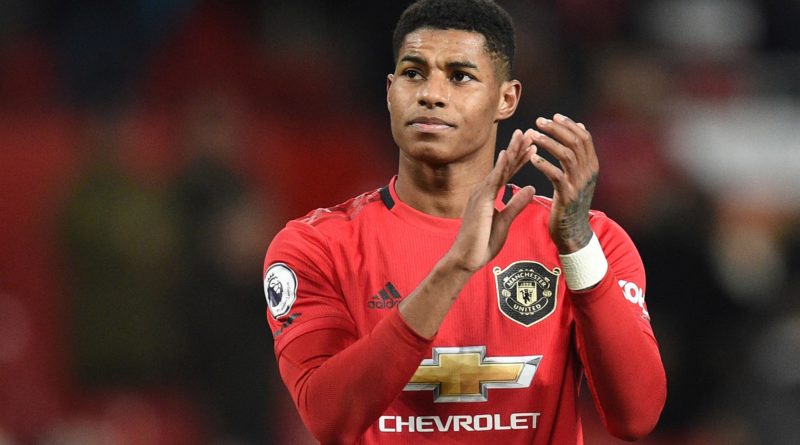There is unequivocally no room for racism in sports
England and Manchester United forward Marcus Rashford was one of three players that were victims to a persistent issue in the sports world: racism on social media. Photo courtesy of Oli Scarff, AFP – Getty Images.

Peter Burtnett | Sports Editor
One of the worst places to be on social media is the comment section and replies of the losing team after a game. Some responses are mild or joking, such as, “I don’t want to be a fan of this team anymore,” or making fun of the loss in a mild manner.
But that light-hearted response can often turn sour, as expletive-laden tweets and comments on Instagram and Facebook target the team as a whole, the individual players and coaches, or even the team owner or general manager. As bad as the comment sections can get, the private messages that players receive can turn horribly inhumane.
A popular horrific message from false “fans” – people who claim to be supportive of a team or player but abuse the player when they make a mistake or lose a game – calls for a player to kill themselves or expresses a desire for something terrible to happen to the player’s family.
This was brought to the forefront of sports when Spain and Juventus men’s soccer forward Alvaro Morata was subjected to such messages as he continued to struggle to find the back of the net leading up to and during the European Championships (also known as the Euros).
As horrible and disturbing as these sorts of messages are, a far more common form of hate-filled messages goes after something that has nothing to do with a players’ ability or success on the field of play: race.
Racism in sports is an issue that has been a topic of heavy discussion in the past, but has often been ignored in today’s sports world. In 1947, Jackie Robinson made his debut as the first African-American to play in Major League Baseball. Even in what should have been a time of celebration for a major step forward toward diversity in baseball, Robinson’s treatment from “fans” when he got there is portrayed in a relatively PG-manner in the movie 42.
Other sports had their own similar challenges either before or after Robinson made his first appearance in a white-dominated sport, but many think that by the time other black players like Larry Doby or Frank Robinson made their mark in the sport, racism suddenly disappeared. That is anything but true.
The issue of racism in sports has picked up steam recently, especially in Europe, where catchphrases like “No Room for Racism” and initiatives against all forms of discrimination have jumped to the forefront of the news. However, as much as organizations like the Football Association in England have been active in trying to stamp out racism, the same problem persists within their own borders.
Most recently after the UEFA Euro 2020 Final on July 11, 2021, between winners Italy and runners-up England, three black English players – Marcus Rashford, Jadon Sancho and Bukayo Saka – were subject to racist messages after missing their penalties during the shoot-out to decide the winner.
Now, I want to examine this particular instance as an example of why racism (and other forms of abuse, online or elsewhere) has no place in sports and must be eradicated.
First, the players are human beings. That should be enough for any rational person to avoid abusing the players, but let’s take a deeper dive into the issue. It should go without saying, but racism is a problem, to put it mildly, that pervades sports and life. Besides the basic fact that no human being should be subjected to racism or other abuse, Saka, Sancho and Rashford are 19, 21 and 23 years old, respectively.
In what is commonly referred to as the most pressure-packed moment in sports, these three young men, one a teenager, stepped up for their country with the hopes of 56 million people on their shoulders. Imagine for a moment that pressure, and then feeling the disappointment when the penalty was saved.
By itself, the penalty miss will be something that these players won’t be able to forget. Pile on that disappointment, the racist abuse they received afterward, and the feelings of disappointment combine with all the feelings that come from being racially abused to create a mess of toxic feelings.
The outpouring of support for Rashford, Sancho and Saka since July 11 has outweighed the abuse, but the pain that comes from being racially abused is still there. A mural of Rashford was vandalized, a disgusting reaction against the young Manchester United forward who has provided thousands of meals for the less fortunate children of England.
That point itself is another factor in making the abuse even more vile. While this young man has helped feed a nation’s children, one mistake on the football pitch and some of that nation’s “fans” go back to calling him any number of racist names.
Simply summarized, racism is a vile problem that is too often left unchecked, especially on social media. Instagram has revealed new measurements to combat social media abuse, but the abuse received by the three England players happened two months after the Sky Sports News article was published. A vital question with no simple answer remains: What can be done to eradicate racist abuse on social media?
The measures by Instagram, supposed to be rolled out within a few weeks of the original April 21 publication date, are designed to utilize a new tool to filter a “predefined list of offensive terms and emojis” so that a viewer will not have to view the abusive words.
A main concern has been that the accounts used to abuse players are deactivated for a short period of time, and not long term, as many suggest. Long term bans do not occur until multiple offenses, but this still doesn’t address the potential for the same abusers to fire racism at players repeatedly from different accounts.
The suggestion for this problem is to have a more in-depth account application process, perhaps even needing to use government identification or some other verification method when a user makes an account. This way, the same people who abuse players could not continuously repeat the same offense.
However, this solution is only how racist abuse could be limited or even stopped online. At the end of the day, the issue of racism is one that needs to be solved at a global scale and stopped at the source. A whole encyclopedia could be written about the problems of racism and other online abuse, and equally as much offering solutions to the problem.
But to keep it simple, there is no room for racism in sports, and we as sports fans need to do everything in our power to help eradicate such vile hate from the sports we love.
For more sports news like Flyer News on Facebook and follow us on Twitter (@FlyerNews & @FlyerNewsSports) and Instagram (@flyernews)

